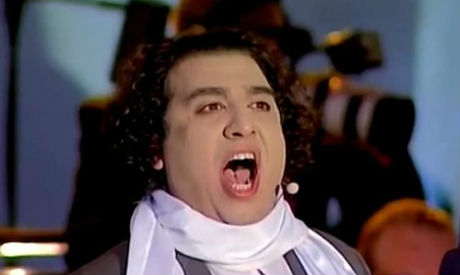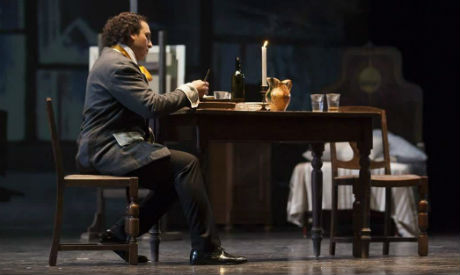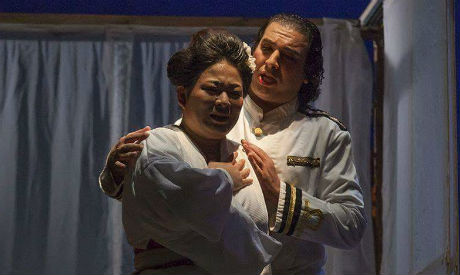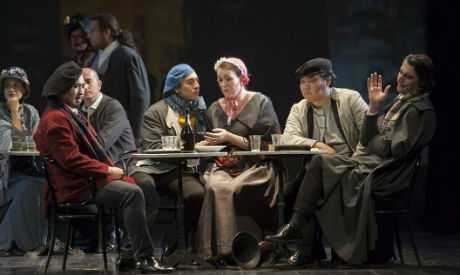In the last days of June, the Egyptian opera scene celebrated a new achievement by one of its sparkling representatives. The young Egyptian tenor Ragaa Eldin won one of the major awards at the International Tenors Tournament, a competition for singers judged by audience and opera aficionados which takes place in the northwestern Polish city of Szczecin. The event was organised by the city’s opera house at the impressive, 4,500-seat Summer Amphitheatre, an open-air stage surrounded by a spacious park — the city’s pride, and one of the largest open-air performance spaces in Poland. The tournament follows the principles of a knightly duel in which the singer’s victory is decided by the audience, who vote with roses.
Launched in 1994, the Szczecin’s International Tenors Tournament has become one of the most popular events of the season and an understandable audience magnet. Each year, singers from all around the world send their portfolios to the organisers, who grant a privilege of taking part in the tournament to only eight tenors.
This year, on 24 June, the singers who took the stage came from Poland, Bulgaria, Ukraine, Georgia, Russia, Portugal — and from Egypt took the stage. It is worth mentioning that the Szczecin audience has probably never had the chance to listen to an opera singer from the Arab world, which made Ragaa Eldin’s participation an unusual event in this unique Pomeranian city.

Tenor Ragaa Eldin sings during the International Tenors Tournament in Szczecin, Poland (Photo: still from the televised fragments of the tournament)
Nor did our home-grown talent disappoint — far from it, even if it was the Russian who won with 835 roses and the Ukrainian who won the Orchestra Award. With two arias — Pourquoi me reveiller from Jules Massenet’s Werther (based on Goethe’s masterpiece The Sorrows of Young Werther) and a Neapolitan — Ragaa Eldin still won the award of the Association of Opera and Operetta Enthusiasts in Szczecin.
“I knew that the choice of Werther was unusual for an audience that is not necessarily acquainted with a larger operatic repertoire, but this is also why I thought of introducing the aria to the audience. It is very beautiful and challenging,” Ragaa Eldin reveals in an online voice interview, adding that he was truly surprised and honoured to have received one of the main awards. “It was a wonderful experience and an amazing audience, very involved in the whole event.”
This is not the first international accomplishment of the Egyptian tenor. Back in 2013, Ragaa Eldin decided to leave Egypt in search of opportunities in the international arena. Ragaa Eldin’s singing career had already begun several years earlier when he entered the Cairo Conservatory to study with professor Sobhi Bidair. He also obtained a diploma in music performance from Trinity College through their representative entity in Egypt. He started singing at the Cairo Opera’s A Capella Choir, and played smaller solo parts in operatic performances and gala concerts as well.
Ragaa Eldin explains that his first performance on the international music scene, which took place in Morocco in 2007, had a major bearing on his future professional choices, and, he decided to enrol in a master class with soprano Caroline Dumas at the l’Ecole Normale de Musique in Paris. Soon after that, in 2008, he became an official member of the Cairo Opera Company. While he resumed his development — through annual participation in the Finnish-Egyptian Musical Bridge in Cairo, during which he caught the eye of international professors — the young singer’s life was not a bed of roses. Studying abroad seemed financially too challenging and, despite being accepted, he had to give up on an opportunity to pursue further education at the Queen Sofía College of Music in Madrid. Even more setbacks occurred in 2011, when he was called to military service and his commitments at the Cairo Opera were reduced to a minimum.

Tenor Ragaa Eldin in La Boheme at the Teatro Mancinelli, Italy (Photo: courtesy of the artist)
It was in 2013 that perseverance paid off. With support from Caroline Dumas, Ragaa Eldin was granted a full scholarship from the French government to embark on full-fledged studies at the l’Ecole Normale de Musique in Paris, completing the Diplôme supérieur d’Art Lyrique and Diplome de Perfectionnement in due course (2014-2016). In 2015, he was named a finalist of the Italian “Spazio musica” competition, winning the audience prize as well as a student scholarship at Scuola dell’Opera Bologna Italy for Performing Arts.
Besides his studies, doors began opening to Ragaa Eldin. From small concerts, Ragaa Eldin soon moved to being offered important roles. In 2014, he was offered his first leading role as Manrico in the Tèatro Mancinelli production of Il Trovatore at Orvieto, Italy, conducted by Maurizio Arena. In the following few years Ragaa Eldin sang several leading roles in international operas, including Puccini’s La Boheme and Madame Butterfly, Mascagni’s Cavalleria rusticana (also at the Teatro Mancinelli) and Massenet’s Werther at La Peniche Opera in Paris.
“I am continuously learning. I was very lucky to be working with the renowned maestro Maurizio Arena in La Boheme, at the Teatro Mancinelli. He has great experience, knowledge and vision. In many ways he resembles Riccardo Muti except that he refuses to be in the spotlight. Maurizio Arena specialises in Puccini and when working on the opera, he follows the text with the utmost precision, without falling into the stiff traps of older schools yet respecting them; he looks into all the phrasings. He is truly amazing and I benefited a lot from working with him. I also learned a lot from vocal trainer soprano Gabriella Ravazzi,” Ragaa Eldin explains. He adds that he is currently working on the leading role of Gaston in Verdi’s Jerusalem, scheduled to premiere in the last week of September at the Teatro Regio di Parma, Italy, as part of a large festival dedicated to Verdi.
It seems that, though currently based in France, Ragaa Eldin finds many opportunities in Italy. “I’m being supported by an agent, I’m auditioning a lot. I am still not sure where life will take me.” And while he is settling on a final destination, or perhaps just moving from one opportunity to another (all unfortunately outside Egypt), Ragaa Eldin continues to work hard. “Life is very difficult and the field is very competitive in Europe. There are many artistic and economic challenges. I know singers who cannot cope with all the pressure and give up on their careers altogether, look for an income elsewhere,” he explains.

Tenor Ragaa Eldin in Madame Butterfly at the Teatro Mancinelli, Italy. (Photo: courtesy of the artist)
While his commitments abroad intensify, Ragaa Eldin tries to maintain his connection with Egypt as much as possible, even if the frequency of his appearances here is dropping. In 2015, he took part in Verdi’s Il Trovatore directed by Hisham El-Tally, and also in Days and Nights of the Heart Tree by French-Algerian writer and composer Tarik Benouarka featuring Al-Nour Wal Amal Chamber Orchestra, staged in Egypt and France (2015). He also participated in Dvořák’s Stabat Mater with the Cairo Symphony Orchestra conducted by Yuriy Yanko in 2016.
Ragaa Eldin’s voice takes a nostalgic tone when he speaks about his home country. “It is not easy in Egypt either. It is partly linked to financial challenges,” he says, adding that other hardships include the limited opportunities in the country and challenges within the artistic and operatic field. “It’s been a long time since the Cairo Opera refreshed its operatic repertoire, partly due to economic reasons. Yet even international artistic cooperations are much fewer now than before. I wish there were more chances for the young Egyptian singers, though now I am no longer aware who the young generation is.”
He mentions names such as sopranos Fatma Said, Amira Selim, mezzo Gala El Hadidi, tenors Hany Dessouky, Georges Wanis, bass-baritone Ashraf Sewailam as examples of talented Egyptian singers who chose to pursue their careers outside Egypt.
“Economic challenges aside, I wish there was more effort and support given to Egyptian talents. I experienced many obstacles and the first significant, not to say life-changing support I received, unfortunately, was not from the Egyptian government, but from the French one,” he recalls the scholarship that took him to l’Ecole Normale de Musique in Paris. “Egypt has great creative strength in its many artists and singers; they are all ambassadors of this country. They should be embraced and supported as much as possible.”
Ragaa Eldin goes on to encourage young talents in Egypt to keep looking for opportunities. “It is not easy but with perseverance, through keeping your eyes and minds open, through continuous development of contacts, everything is possible.”

Tenor Ragaa Eldin [centre] in a group scene, in La Boheme at the Teatro Mancinelli, Italy (Photo: courtesy of the artist)
This article was first published in Al Ahram Weekly
For more arts and culture news and updates, follow Ahram Online Arts and Culture on Twitter at @AhramOnlineArts and on Facebook at Ahram Online: Arts & Culture
Short link: